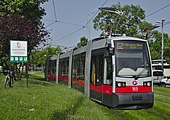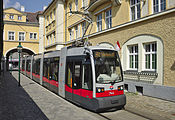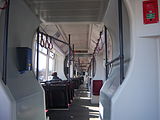Ultra Low Floor


The Ultra Low Floor tram (ULF) is a low-floor tram operating in Vienna, Austria, and Oradea, Romania, built by a consortium composed of Siemens and ELIN in Vienna. It has the lowest floor-height of any such vehicle.
Overview
[edit]
In contrast to other low-floor trams, the floor in the interior of ULF is at sidewalk height (about 20 cm or 7.9 inches above the road surface), which makes access to trams easy for passengers in wheelchairs or with baby carriages. This configuration required a new undercarriage. The axles had to be replaced by a complex electronic steering of the traction motors. Auxiliary devices are installed largely under the car's roof.
The ULF technology went into testing in the early 1990s. Since 1998, ULFs have been in use on Vienna's tram network. As of mid-2008, 302 cars were in operation (150 cars since mid-2006, and another 152 as of 2007).
Siemens ULF trams were introduced in Oradea, Romania, on 24 April 2008, and are the only ULF trams outside Austria.[1]
Technical specifications
[edit]| City / Operator | Type designation | Built in | Number of vehicles | Length | Width | Weight (empty) | Maximum power |
|---|---|---|---|---|---|---|---|
| Vienna / Wiener Linien | A | 1995 (prototype), 1997 | 50 | 24.2 m (79 ft 4+3⁄4 in) | 2.4 m (7 ft 10+1⁄2 in) | 30 t (29.5 long tons; 33.1 short tons) | 6 × 60 kW (80 hp) |
| A1 | 2007–2015 | 80 | 6 × 36 kW (48 hp) | ||||
| B | 1995 (prototype), 1998 | 100 | 35.3 m (115 ft 9+3⁄4 in) | 43 t (42.3 long tons; 47.4 short tons) | 8 × 60 kW (80 hp) | ||
| B1 | 2009-2015 | 100 | 8 × 36 kW (48 hp) | ||||
| Oradea / OTL | A1 | 2008–2009 | 10 | 24.2 m (79 ft 4+3⁄4 in) | 30 t (29.5 long tons; 33.1 short tons) | 6 × 36 kW (48 hp) |
Gallery
[edit]-
Electronic and engine parts on the head of two ULF
-
Trial unit of a ULF in Vienna, 1994
-
Short version (Type A) of first-generation ULF in Vienna
-
Long version (Type B) of the second-generation ULF in Vienna
-
Short version (Type A1) of the second-generation ULF in Vienna
-
Long version (Type B1) of the second-generation ULF in Vienna
-
ULF (A1) Oradea (2010)
-
Interior of a first-generation ULF
-
Interior of a second-generation ULF
See also
[edit]References
[edit]- ^ "Oradea orders export ULF". Railway Gazette International. 5 Feb 2008.
External links
[edit]- Railway Gazette
- Siemens ULF technical overview
- (in German) Ulf story
- (in German) Unofficial website about Ulf









